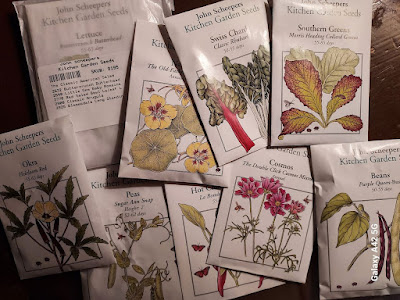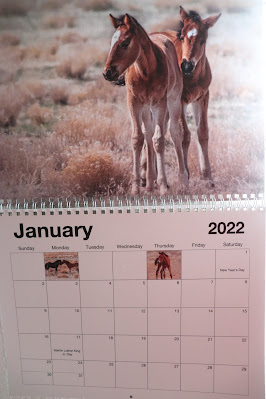 |
| February 9 seems early, even for hellebore. |
(Always) More Garden Thoughts
Other than a few remnant patches here and there, our snow melted and evaporated, leaving bare, squashed grass, weeds, and last autumn’s fallen leaves, a tired palette not at all brightened by a string of grey, overcast days. Cold wind didn’t help, either. During an unseasonably warm spell, my sturdy hellebore dared to put forth blossoms. Will they survive, now that the temperature has gone back below freezing at night?
Friday was busy in the bookstore, Saturday not, but a cheery surprise awaited me at the post office: my seed order had arrived!
 |
| Small packages hold big dreams. |
It may not look like much, but my kitchen garden is small, so I tried not to get carried away, because besides these packets I’ll be starting tomatoes from seed and, as usual, buying other plants as my budget permits. Oh, frabjus joy! Another year of gardening! More planting and weeding and watering and pruning and moving things around in the endless search for the right placement for all -- the doing as rewarding as the results, if not more so.
 |
| Seeds to start indoors -- |
Six weeks from last frost date. As I see it, that means it will be mid-April when I’ll have to rearrange my home office to make way for seed trays and pots in the big south-facing window. Meanwhile, at the bookstore, the big pot of parsley continues to thrive, as do geraniums, asparagus fern, and citronella. Citronella has small pink blossoms! Not showy, but still, it’s cheery and encouraging at this time of year to see any kind of blooms. The citronella will go back outdoors for the summer, but perhaps I should break off some leaves now to take home and deploy as mouse repellant? Because a couple of those little devils made uninvited indoor appearances recently....
More Book Thoughts
Since my last blog post (which was shorter than usual, with not a single picture of my dog), I’ve continued to think about Bonnie Jo Campbell’s novel, The Waters, in connection with Tara Westover’s memoir, Educated. A novel is fiction, a memoir nonfiction, so that’s an important difference, not to be forgotten, and there are others. For example, The Waters puts a woman in the driver’s seat, as it were: Hermine Zook, the healer, dominates the island as well as the hearts and minds of her daughters and granddaughter. Westover, on the other hand, despite relationships with her mother and sisters, is ruled over (as are the mother and sisters and brothers) by her father in more ways than one. Her brothers play major roles in her life, as well -- for better or for worse.
As for similarities, here I’ll quote what I wrote a few days ago: “Yet in both stories, unlike as they are in so many ways, there is a family isolated from its own surrounding community, as well as from the larger world; a young girl, hungry to learn, who is kept out of school; a mother who knows herbs and how to take care of babies; and violence, an omnipresent threat, that breaks out from time to time without warning.”
Continuing to think about both stories, the fictional and the actual, has led me to watch several interviews each with authors Campbell and Westover. (I’ve linked two here, and you can find many others by searching online yourself.) One thought since my last post (this came from the linked interview with Campbell) is how important choice is to the women we meet in both stories. As in life, much happens that was not chosen by Tara or Hermine or Rose Thorn or Donkey, but in other moments and situations they did make choices, sometimes considered for a long while beforehand, but not always. Sometimes impulse gave voice to feelings that had been simmering unrecognized beneath the surface until the moment they burst through.
Tara’s father made many choices for her before she became strong enough to know what she wanted for herself, and the same was true of Donkey, with her mother and grandmother deciding her fate for years. Is personal growth is a paradox or a feedback loop? It is only by making choices that we become ourselves, and at the same time we have to gain knowledge of ourselves in order to be strong enough to make choices that we need to make.
(Campbell seems to be having a wonderful time with her book tour travels and visits, and she has certainly earned every bit of the attention she’s getting. Also, as she herself notes, it doesn’t make sense to spend years working on a book and then not do everything possible to get it into readers’ hands. Westover’s memoir was a sensation when it first appeared in 2018, and she was a national phenomenon, appearing everywhere, so if she has chosen to disappear from the public eye for a while, as it seems is the case, one can hardly wonder at that decision.)
The question of home, like that of choice, looms large for Tara in the memoir and for the women of M’sauga Island in the novel. Molly and Prim have left the island to live elsewhere, and Molly wants her mother and Donkey to move off the island, too, but Hermine would not be at home anywhere else, and the four adult women are “more themselves” when there, together, the author tells us, even when they are at odds with each other. For Hermine and Donkey, the relationship to the natural world in which they live is as important as Rose Cottage. But Donkey needs a larger world, one that includes school – and boys and men.
Tara Westover had to leave her mountain home to go to school, and she wanted to go much more than she wanted to stay, and yet the mountain pulled her back over and over again. In “the end” -- of the memoir, that is, which isn’t “the end” of her story, of course, since she and family members are all still alive -- she had to lose half her family, including both parents, in order to be true to herself. It was interesting, however, that in one of her appearances (on a podcast called “Mormon Stories”), two of her aunts and a cousin showed up to support the decisions she had made.
Q. If Tara Westover were to read The Waters (and I hope she will), would she think Campbell romanticized rural isolation and the life of a child kept out of school and away from doctors, despite the violent incidents that take place in the novel?
Q. If Bonnie Jo Campbell were to read Educated (and perhaps she has), I’m sure she would point out differences between the Westover family and the Zooks, but would she also see parallels in the strength that both Tara and Donkey needed to make their own way in a larger world?
I keep searching out interviews with both authors and will continue to think about their stories, I’m sure, for a long time to come.
More Dog Reports and Thoughts
 |
| Two years ago I often called her "Tiny Girl." |
Sunny and I have been to the dog park in Northport a couple times in the past weeks, and she has made some new friends, human and canine. The last time we were there, she was one of four dogs (about an ideal number, as far as I’m concerned, at one time), the others a hound named Gilbert (who chases soap bubbles) and two Labrador retrievers, but Sunny Juliet was the only one of the four with any interest in chasing tennis balls. I thought of my sister saying that their Labs have never been big on chasing balls, and for the first time it occurred to me that while Labs are “retrievers,” they are bird dogs, and the hunter does not throw a bird for the dog to bring back! Ah, but then I remember a friend’s golden retriever, who would chase and bring back tennis balls for as long as anyone could be persuaded to throw them, so – small sample, no conclusions here. Any thoughts on this burning question?
As for why a dog like Sunny, bred for herding, would care for tennis ball play, I have no explanation, and neither can I venture a guess why she behaves like a terrier – dig! dig! dig! -- whenever she senses a mouse or mole in a pile of brush or underground.
Oh, and then there is her fascination with wild animals that take refuge in our old, ramshackle barn! Birds and feral cats and skunks, you name it. Sunday morning she had a mild skunking, what I call a "skunking-at-a-distance," i.e., not so strong as to bring tears to human eyes but still not a smell I would want on my bed, so out came the Dawn detergent (2 T), hydrogen peroxide (1 quart), and baking soda (1/4 cup) for a deskunking bath (need to renew those important supplies), plus a strip of bacon to lure her into the bathtub. She was not eager but didn’t make a big fuss, thank heaven. Important note: The deskunking mixture must not be mixed up ahead of time and/or ever stored in a closed container! But if you have a dog, it’s a good idea to have the ingredients and recipe on hand.
Afterward, she was full of smiles and wiggles and so much energy that I gave her three of the calming treats that would have been helpful, maybe, an hour earlier. Supplies have since been restocked, but I do have to hope that Sunny won't go back for more skunk experiences any time soon!
 |
| None the worse for her experiences! |






















